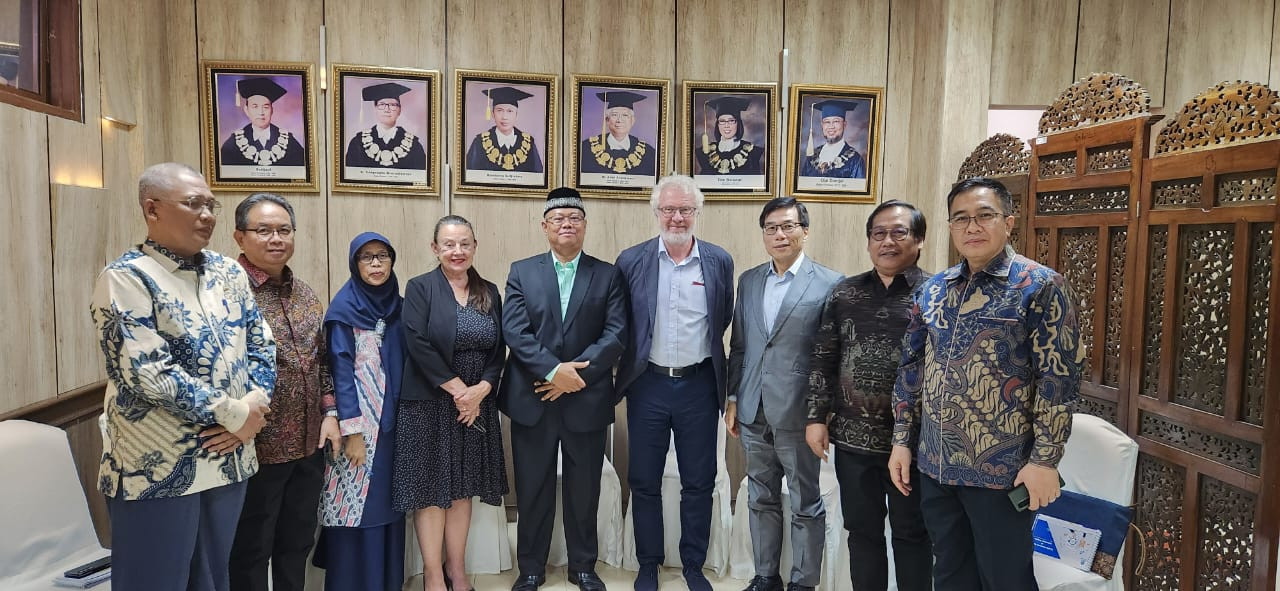Popular Reads
Top Results
Can't find what you're looking for?
View all search resultsPopular Reads
Top Results
Can't find what you're looking for?
View all search resultsUniversitas Terbuka under review by ICDE for quality improvement
Change text size
Gift Premium Articles
to Anyone
T
he Open University (Universitas Terbuka, UT), which specializes in long-distance higher education services, has invited quality reviewers from the International Council for Open and Distance Education (ICDE) as part of its continuous endeavors to improve its educational services.
The year 2023 is the fifth year that UT has been assessed by quality reviewers from the ICDE. Previous quality reviews were conducted in 2005, 2010, 2016 and 2019.
UT rector Ojat Darojat said that the quality review primarily aimed to ensure that open and distance education in Indonesia was carried out in the right way and corresponded with international standards.
“We want to make sure at UT that we are operating based on a set of criteria that can meet varying needs, such as serving students, registration activities, curriculum, examinations, modules etc. We also want other competent people’s perspectives about our UT, especially about how we manage UT,” Ojat said in a press conference at UTCC in South Tangerang on July 17.
The competent people he mentioned in this regard, which UT has invited include Prof. Ebba Ossioannillsson, chair of the ICDE OER Advocacy Committee and ICDE OER ambassador for global advocacy, Sweden; Prof. Morsen Flate Paulsen, of the Norwegian University of Science and Technology and former ICDE secretary-general; and Prof. Kam Cheong Li, Dean of the School of Open Learning at Hong Kong Metropolitan University.
According to Ojat, the ICDE has the capacity to conduct a quality review in terms of how to conduct or to maintain delivery of teaching at UT.
“By conducting this kind of program, we hope that our university has the right to take action moving forward for our better future,” he said.
Two major challenges face UT regarding the quality review program, namely accessibility to the internet, especially for people living in remote areas, and computer literacy.
“A lot of people living in remote areas have no access to the internet. But the lack of technological literacy also remains challenging,” he noted.
“Despite the lingering challenges, we have to educate them. Quality is the pillar of our future,” he said.
Ojat said that following its status as a state open or distance university with a legal entity (PTN-BH) in Indonesia, UT should constantly improve its quality and strengthen student engagement in the learning process. “Apart from that UT is also entrusted by the government to increase the number of students to up to 1 million and develop the Indonesia Cyber Education [ICE] Institute,” he said.
The quality review by the IECD is expected to spur improvement of quality and transform it into a word class education service provider as an embodiment of a stronger academic authority, according to Ojat.
Revealing the crucial issues to be addressed with regard to the quality review, Ossioannillsson mentioned educational challenges, students’ perspectives, international best practices, resources, flexibility in curriculum, transparency, change of demography, upscaling and reskilling, accessibility and trust.
“We will also discuss sustainability of education, especially SDG number four on quality education. It is also crucial to discuss accessibility, equity, diversity and inclusiveness. We really embrace education for all, leaving none behind,” she said.
Apart from meetings with various stakeholders, including students, staff from different departments and digital offices, the ICED will also provide recommendations to UT for further improvement.
“Quality is about people. It is a process that involves resources and policy,” she said.
Cheong Li said that open universities in Southeast Asia had quality-control mechanisms to ensure high quality. “Almost all of them focus on ensuring the quality through their local or institutional education system.”
“UT is the only university, that I am aware of, that has taken a bold step so far. It not only ensures quality related to internal systems but it also provides access for national and international bodies to look at the system, which is remarkable, outstanding,” he said.
Paulsen said the open-university concept had been around for decades. “It introduces ‘open’. ‘Open’ means a lot of things, such as access. How we can have more students with access from remote areas and working families? It provides an opportunity to study,” he said.
“’Open’ also means flexibility. You can start whenever you want and progress is made in your own phase. So, there are valuable things to think of,” he said.
UT rector Ojat in his presentation earlier revealed the rising number of young people interested in pursuing higher education at UT. As of April 2023, the number of students aged 25 was recorded at 226,441, compared with 22,111 aged between 40 and 44 and 15,595 aged over 44.
Despite the rising number of young people attracted to pursuing higher education at UT, UT still focuses on attracting all people. “Like Paulsen said earlier ‘open’ means all people in urban or rural and remote areas having access to higher education. ‘Open’, referring to a place, means whether Indonesians living in their home country, or overseas, have equal access to higher education of good quality like UT,” he said.
This explains why UT has set a strategy of “picking up the ball”, which means UT comes to prospective students’ homes, delivering material to them, instead of requiring them to go to the university to collect the material, according to Ojat.
“We also encourage life-long learning. They [students] can take degree or non-degree courses, depending on the capacity that they are eager to study at our university.”










